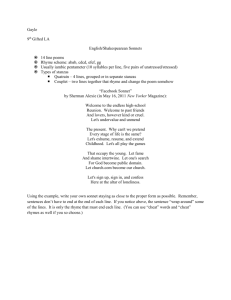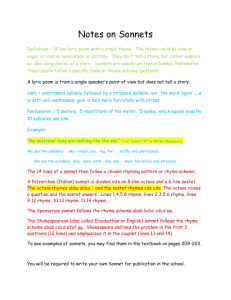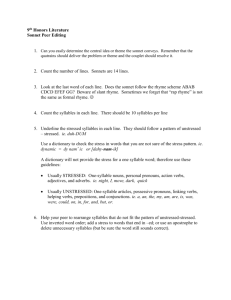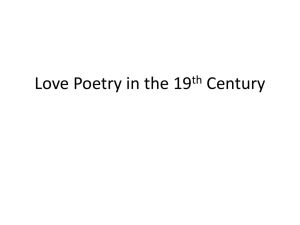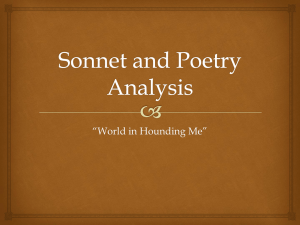Poetry Terms for 3rd Grading Period EPAP
advertisement
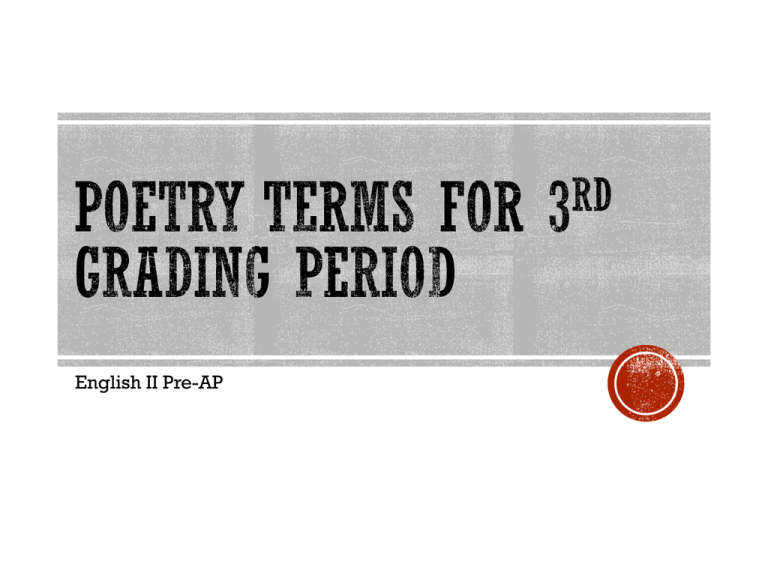
English II Pre-AP Allusion is a short, informal reference to a famous person or event: You must borrow me Gargantua's mouth first. 'Tis a word too great for any mouth of this age's size. --Shakespeare If you take his parking place, you can expect World War II all over again. Plan ahead: it wasn't raining when Noah built the ark. --Richard Cushing Our examination of the relation of the historian to the facts of history finds us, therefore, in an apparently precarious situation, navigating delicately between the Scylla of an untenable theory of history as an objective compilation of facts . . . and the Charybdis of an equally untenable theory of history as the subjective product of the mind of the historian . . . . --Edward Hallett Carr Notice in these examples that the allusions are to very well known characters or events, not to obscure ones. (The best sources for allusions are literature, history, Greek myth, and the Bible.) Note also that the reference serves to explain or clarify or enhance whatever subject is under discussion, without sidetracking the reader. Allusion can be wonderfully attractive in your writing because it can introduce variety and energy into an otherwise limited discussion (an exciting historical adventure rises suddenly in the middle of a discussion of chemicals or some abstract argument), and it can please the reader by reminding him of a pertinent story or figure with which he is familiar, thus helping (like analogy) to explain something difficult. The instantaneous pause and reflection on the analogy refreshes and strengthens the reader's mind. Mnemonic for remembering ALLUS ION Allusions make reference to events or people considered to be well known, or known by of ALLUSION! Anaphora is the repetition of the same word or words at the beginning of successive phrases, clauses, or sentences, commonly in conjunction with climax and with parallelism: To think on death it is a misery,/ To think on life it is a vanity;/ To think on the world verily it is,/ To think that here man hath no perfect bliss. --Peacham In books I find the dead as if they were alive; in books I foresee things to come; in books warlike affairs are set forth; from books come forth the laws of peace. -Richard de Bury Finally, we must consider what pleasantness of teaching there is in books, how easy, how secret! How safely we lay bare the poverty of human ignorance to books without feeling any shame! --Ibid. The wish of the genuine painter must be more extensive: instead of endeavoring to amuse mankind with the minute neatness of his imitations, he must endeavor to improve them by the grandeur of his ideas; instead of seeking praise, by deceiving the superficial sense of the spectator, he must strive for fame by captivating the imagination. --Sir Joshua Reynolds Slowly and grimly they advanced, not knowing what lay ahead, not knowing what they would find at the top of the hill, not knowing that they were so near to Disneyland. They are the entertainment of minds unfurnished with ideas, and therefore easily susceptible of impressions; not fixed by principles, and therefore easily following the current of fancy; not informed by experience, and consequently open to every false suggestion and partial account. --Samuel Johnson Anaphora can be used with questions, negations, hypotheses, conclusions, and subordinating conjunctions, although care must be taken not to become affected or to sound rhetorical and bombastic. Consider these selections: Will he read the book? Will he learn what it has to teach him? Will he live according to what he has learned? Not time, not money, not laws, but willing diligence will get this done. If we can get the lantern lit, if we can find the main cave, and if we can see the stalagmites, I'll show you the one with the bat skeleton in it. Adverbs and prepositions can anaphora, too: They are masters who instruct us without rod or ferule, without angry words, without clothes or money. --Richard de Bury She stroked her kitty cat very softly, very slowly, very smoothly. Mnemonic for remembering ANAPHORA AFRO would be fun to have. AN AFRO would make me taller. AN AFRO would impress ladies. AN AFRO would cover my bald spot. AN AFRO would be like having a pillow always. AN AFRO would be an amusement park for my lice. ANAPHORA! Antithesis establishes a clear, contrasting relationship between two ideas by joining them together or juxtaposing them, often in parallel structure. Human beings are inveterate systematizers and categorizers, so the mind has a natural love for antithesis, which creates a definite and systematic relationship between ideas: To err is human; to forgive, divine. --Pope That short and easy trip made a lasting and profound change in Harold's outlook. That's one small step for a man, one giant leap for mankind. --Neil Armstrong Antithesis can convey some sense of complexity in a person or idea by admitting opposite or nearly opposite truths: Though surprising, it is true; though frightening at first, it is really harmless. If we try, we might succeed; if we do not try, we cannot succeed. Success makes men proud; failure makes them wise. Antithesis, because of its close juxtaposition and intentional contrast of two terms or ideas, is also very useful for making relatively fine distinctions or for clarifying differences which might be otherwise overlooked by a careless thinker or casual reader: In order that all men may be taught to speak truth, it is necessary that all likewise should learn to hear it. --Samuel Johnson The scribes and Pharisees sit on Moses' seat; so practice and observe whatever they tell you, but not what they do; for they preach, but do not practice. --Matt. 23:2-3 (RSV) I agree that it is legal; but my question was, Is it moral? The advertisement indeed says that these shoes are the best, but it means that they are equal; for in advertising "best" is a parity claim and only "better" indicates superiority. Note also that short phrases can be made antithetical: Every man who proposes to grow eminent by learning should carry in his mind, at once, the difficulty of excellence and the force of industry; and remember that fame is not conferred but as the recompense of labor, and that labor, vigorously continued, has not often failed of its reward. --Samuel Johnson Mnemonic device for ANTI THESIS - OPPOSITE - STATEMENT ANTITHESIS! I love writing thesis statements, but I hate antithesis examples. Apostrophe interrupts the discussion or discourse and addresses directly a person or personified thing, either present or absent. Its most common purpose in prose is to give vent to or display intense emotion, which can no longer be held back: O value of wisdom that fadeth not away with time, virtue ever flourishing, that cleanseth its possessor from all venom! O heavenly gift of the divine bounty, descending from the Father of lights, that thou mayest exalt the rational soul to the very heavens! Thou art the celestial nourishment of the intellect . . . . --Richard de Bury O books who alone are liberal and free, who give to all who ask of you and enfranchise all who serve you faithfully! -- Richard de Bury O Jerusalem, Jerusalem, the city that kills the prophets and stones those sent to her! How often I wanted to gather your children together, just as a hen gathers her brood under her wings, and you would not have it! --Luke 13:34 (NASB) Apostrophe does not appear very often in argumentative writing because formal argument is by its nature fairly restrained and intellectual rather than emotional; but under the right circumstances an apostrophe could be useful: But all such reasons notwithstanding, dear reader, does not the cost in lives persuade you by itself that we must do something immediately about the situation? Mnemonic for remembering APOSTROPHE APOSTROPHE! O remorse, why do you keep me awake at night? To Remorse OFFICE Similar vowel sounds repeated in successive or proximate words containing different consonants: A city that is set on a hill cannot be hid. --Matthew 5:14b (KJV) Let your light so shine before men, that they may see your good works, and glorify your Father which is in heaven. --Matthew 5:16 (KJV) Pete needs cheese to breathe, so we freeze the brie incessantly. The repetition of similar consonant sounds in a group of words. The term usually refers to words in which the ending consonants are the same but the vowels that precede them are different. Consonance is found in the following pairs of words: add and read bill and ball born and burn Mnemonic for remembering - Starts with Ahhhhh (vowel sound) vs. - Sounds like Consonants ASSONANCE & Close similarity or identity of sound between accented syllables occupying corresponding positions in two or more lines of verse. For a true rhyme, the vowels in the accented syllables must be preceded by different consonants, such as fan and ran. A rhyme scheme is the pattern of rhyme between lines of a poem or song. It is usually referred to by using letters to indicate which lines rhyme; lines designated with the same letter all rhyme with each other. Therefore, it is the pattern of end rhymes or lines. Roses are red, A Violets are blue, B My panda is dead, A And I blame you. B A rhyme of two syllables, one stressed and one unstressed, as waken and forsaken audition and rendition treasure and pleasure Feminine rhyme is sometimes called double rhyme. Rhyme that falls on the stressed and concluding syllables of the rhyme-words. Examples include keep and sleep glow and no spell and impel A pause, usually near the middle of a line of verse, usually indicated by the sense of the line, and often greater than the normal pause. For example, one would naturally pause after human in the following line from Alexander Pope: To err is human, to forgive divine. The continuation of the sense and grammatical construction from one line of poetry to the next. Milton’s Paradise Lost is notable for its use of enjambment, as seen in the following lines: ....Or if Sion hill Delight thee more, and Siloa’s brook that flow’d Fast by the oracle of God, . . . . A four-line stanza with any combination of rhymes. When the stars threw down their spears, A And watered heaven with their tears, A Did he smile, his work to see? B Did he who made the lamb make thee? B Any poetic form containing five lines such as tanka, cinquain, and limerick. Autumn Song Know'st thou not at the fall of the leaf How the heart feels a languid grief Laid on it for a covering, And how sleep seems a goodly thing In Autumn at the fall of the leaf? And how the swift beat of the brain Falters because it is in vain, In Autumn at the fall of the leaf Knowest thou not? and how the chief Of joys seems—not to suffer pain? Know'st thou not at the fall of the leaf How the soul feels like a dried sheaf Bound up at length for harvesting, And how death seems a comely thing In Autumn at the fall of the leaf? An eight-line stanza. Most commonly, octave refers to the first division of an Italian sonnet. We talk of taxes, and I call you friend; Well, such you are,--but well enough we know How thick about us root, how rankly grow Those subtle weeds no man has need to tend, That flourish through neglect, and soon must send Perfume too sweet upon us and overthrow Our steady senses; how such matters go We are aware, and how such matters end. A six-line stanza. Most commonly, sestet refers to the second division of an Italian sonnet. Yet shall be told no meagre passion here; With lovers such as we forevermore Isolde drinks the draught, and Guinevere Receives the Table's ruin through her door, Francesca, with the loud surf at her ear, Lets fall the colored book upon the floor. A metrical foot consisting of an unaccented syllable followed by an accented syllable. The words “unite” and “provide” are both iambic. It is the most common meter of poetry in English (including all the plays and poems of William Shakespeare), as it is closest to the rhythms of English speech. In Robert Frost’s “After Apple Picking” the iamb is the vehicle for the “natural,” colloquial speech pattern: My long two-pointed ladder’s sticking through a tree Toward heaven still, And there’s a barrel that I didn’t fill Beside it, and there may be two or three Apples I didn’t pick upon some bough. But I am done with apple-picking now. Essence of winter sleep is on the night, The scent of apples: I am drowsing off. A trochee or choree, choreus, is a metrical foot used in formal poetry consisting of a stressed syllable followed by an unstressed one. Should you ask me, whence these stories? Whence these legends and traditions, With the odours of the forest, With the dew and damp of meadows, An anapaest is a metrical foot used in formal poetry. In classical quantitative meters it consists of two short syllables followed by a long one; in accentual stress meters it consists of two unstressed syllables followed by one stressed syllable. Byron's The Destruction of Sennacherib: The Assyrian came down like a wolf on the fold And his cohorts were gleaming in purple and gold And the sheen of their spears was like stars on the sea When the blue wave rolls nightly on deep Galilee. Unrhymed iambic pentameter. Blank verse is the meter of most of Shakespeare’s plays, as well as that of Milton’s Paradise Lost. Madam, an hour before the worshipp'd sun Peer'd forth the golden window of the east, A troubled mind drave me to walk abroad; Where, underneath the grove of sycamore That westward rooteth from the city's side, So early walking did I see your son: The Shakespearean or English sonnet was actually developed in the sixteenth century by the Earl of Surrey, but is named after Shakespeare because of his great sonnet sequence (a series of sonnets all exploring the same theme) printed in 1609 . The Shakespearean sonnet has the rhyme scheme ABAB CDCD EFEF GG, forming three quatrains (four lines in a group) and a closing couplet (two rhymed lines). The problem is usually developed in the first three quatrains, each quatrain with a new idea growing out of the previous one. Sometimes the first two quatrains are devoted to the same thought, resembling the octave of the Petrarchan sonnet, and followed by a similar volta. Most strikingly unlike the Petrarchan version, the Shakespearean sonnet is brought to a punchy resolution in the epigrammatic final couplet. 120: That you were once unkind befriends me now, And for that sorrow, which I then did feel, Needs must I under my transgression bow, Unless my nerves were brass or hammered steel. For if you were by my unkindness shaken, As I by yours, you've passed a hell of time; And I, a tyrant, have no leisure taken To weigh how once I suffered in your crime. O! that our night of woe might have remembered My deepest sense, how hard true sorrow hits, And soon to you, as you to me, then tendered The humble salve, which wounded bosoms fits! But that your trespass now becomes a fee; Mine ransoms yours, and yours must ransom me. A B A B C D C D E F E F G G The Petrarchan or Italian sonnet has the rhyme scheme ABBAABBA CDECDE. The first eight lines, which all end in either rhyme A [at] or B [og], form the octave. The last six lines, which end in C [ong], D [eck], or E [oose], form the sestet. Variant rhyme schemes for the sestet also include CDCDCD and CDEDCE. There is usually a pause or break in thought between the octave and sestet called the volta, or turn. Traditionally, one main thought or problem is set out in the octave and brought to a resolution in the sestet. The world is too much with us; late and soon, Getting and spending, we lay waste our powers; Little we see in Nature that is ours; We have given our hearts away, a sordid boon! This Sea that bares her bosom to the moon, The winds that will be howling at all hours, And are up-gathered now like sleeping flowers, For this, for everything, we are out of tune; It moves us not.--Great God! I'd rather be A Pagan suckled in a creed outworn; So might I, standing on this pleasant lea, Have glimpses that would make me less forlorn; Have sight of Proteus rising from the sea; Or hear old Triton blow his wreathed horn. A B B A A B B A C D C D C D

